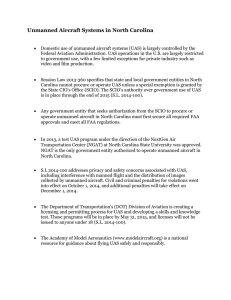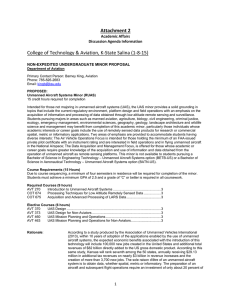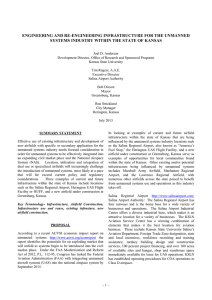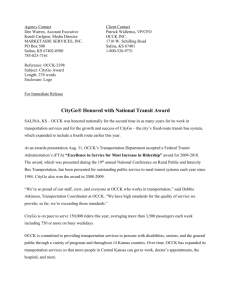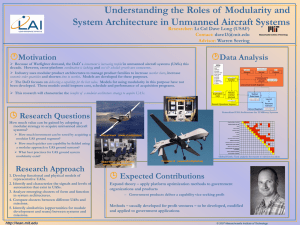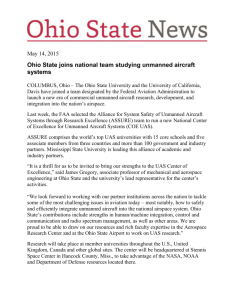Patent awarded to KState preclinical cancer detection test platform
advertisement
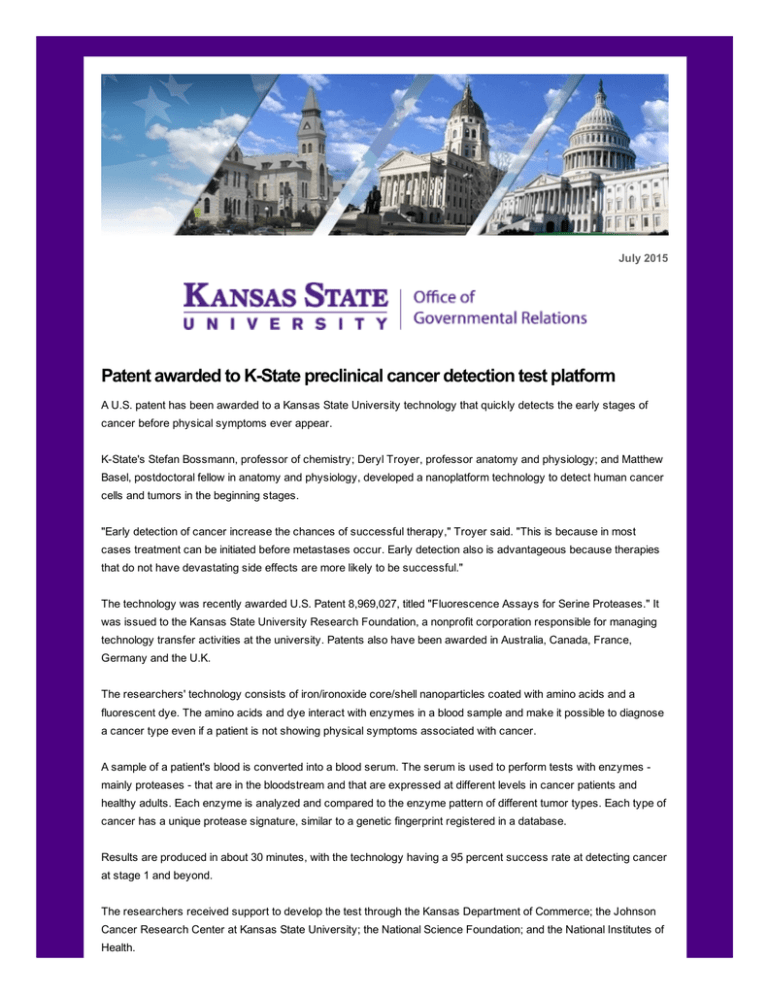
July 2015 Patent awarded to K­State preclinical cancer detection test platform A U.S. patent has been awarded to a Kansas State University technology that quickly detects the early stages of cancer before physical symptoms ever appear. K­State's Stefan Bossmann, professor of chemistry; Deryl Troyer, professor anatomy and physiology; and Matthew Basel, postdoctoral fellow in anatomy and physiology, developed a nanoplatform technology to detect human cancer cells and tumors in the beginning stages. "Early detection of cancer increase the chances of successful therapy," Troyer said. "This is because in most cases treatment can be initiated before metastases occur. Early detection also is advantageous because therapies that do not have devastating side effects are more likely to be successful." The technology was recently awarded U.S. Patent 8,969,027, titled "Fluorescence Assays for Serine Proteases." It was issued to the Kansas State University Research Foundation, a nonprofit corporation responsible for managing technology transfer activities at the university. Patents also have been awarded in Australia, Canada, France, Germany and the U.K. The researchers' technology consists of iron/ironoxide core/shell nanoparticles coated with amino acids and a fluorescent dye. The amino acids and dye interact with enzymes in a blood sample and make it possible to diagnose a cancer type even if a patient is not showing physical symptoms associated with cancer. A sample of a patient's blood is converted into a blood serum. The serum is used to perform tests with enzymes ­ mainly proteases ­ that are in the bloodstream and that are expressed at different levels in cancer patients and healthy adults. Each enzyme is analyzed and compared to the enzyme pattern of different tumor types. Each type of cancer has a unique protease signature, similar to a genetic fingerprint registered in a database. Results are produced in about 30 minutes, with the technology having a 95 percent success rate at detecting cancer at stage 1 and beyond. The researchers received support to develop the test through the Kansas Department of Commerce; the Johnson Cancer Research Center at Kansas State University; the National Science Foundation; and the National Institutes of Health. K­State Salina expands unmanned aircraft systems program With the unmanned aircraft systems, or UAS, industry growing at a rapid pace, Kansas State University Salina is meeting career demands with the addition of a new bachelor's degree and minor beginning this fall. Combining UAS technology with coursework in computer science, electronic engineering and mechanical engineering, K­State Salina is offering a Bachelor of Science in engineering technology with an unmanned aircraft systems option. The new course of study complements the already existing aeronautical technology bachelor's degree in UAS, which is centered around piloting and field operations, by concentrating on the design and implementation of unmanned systems. The university also is adding a UAS minor with both a flight operations focus and a data acquisition and management focus. "K­State Salina is known for being at the forefront of unmanned aircraft systems education and research, and our innovative engineering technology reputation spans 50 years, starting with the creation of our campus," said Verna Fitzsimmons, K­State Salina's dean and CEO. "This hybrid degree, which incorporated principles from both programs, is a practical addition to our academic offerings and an essential addition for the UAS industry." Students enrolling in the engineering technology with an unmanned aircraft systems option degree will not have the requirement of flight ratings. Instead, they will explore the intricacies of how UAS function, such as their software and data, sensors and actuators, and camera systems and other payloads that are critical to accomplishing any task during missions. Additionally, K­State Salina has created an unmanned aircraft systems minor for students outside of the UAS program and from other universities who are looking to supplement their education. K­State Salina is one of the first universities in the nation to offer a bachelor's degree in UAS. Launched in 2011, the program has nearly doubled its enrollment every year. NBAF Summit convenes, focuses on serving animal health and food safety Launch a Business Program awards grand prize honors Two companies were named grand prizewinners in Kansas State University's second Launch a Business (LAB) program. Out of 14 high­potential On June 23­24, 2015, 150 key stakeholders met in Manhattan, KS to discuss the future research activities and operations of the National Bio and Agro­ defense Facility (NBAF). "Pioneering Partnerships with NBAF: A summit with startup ventures, Liquid Art Winery & Estates in livestock producers and the animal health industry Manhattan was chosen as the grand prizewinner in about science, synergy and security" was an the global food systems division, while Vigilias industry­focused, invitation­only summit. It provided a Telemedicine in Wichita, was named the grand centralized location for livestock producers, animal prizewinner in the open division. Each company was health industry leaders, researchers and policy awarded a $10,000 cash prize for its win. makers to start discussions about how NBAF will work with the community and develop a strong working The awards were the culmination of the five­week LAB relationship between government and industry before program, which was sponsored by KS State Bank and the federal laboratory begins its operations. the College of Business Administration's Center for the Advancement of Entrepreneurship. The program Participants shared their ideas, recommendations and provided the 14 selected startups with much­needed needs for research and development, collaborations, resources, including faculty­led courses, hands­on communications and policy during the summit. student research teams and access to the university's world­class alumni mentor network. The summit included keynote speeches by Catherine Woteki, undersecretary for the U.S. Department of "One of our university's goals is to support economic Agriculture's Research, Education and Economics development and growth in the state of Kansas," said mission area and the department's chief scientist, and Chad Jackson, director of the Center for the Christina Murata, chief of staff for the Science and Advancement of Entrepreneurship. "We developed Technology Directorate of the Department of K­State LAB as a way to reach out and support the Homeland Security. entrepreneurs in the state." In her keynote, Woteki said many health, food and More information on the Launch a Business program natural resource­related issues are coming together to is available at www.k­state.edu/lab. create a perfect storm for agriculture, so NBAF will be a frontline in animal health and food safety. Shanklin receives Excellence in Practice for Dietetic Research Award The summit also introduced a highly networked system for the diagnosis, treatment and prevention of infectious diseases. The Bio/Agro Security Innovation The Academy of Nutrition and Dietetics, the world's System, or BASIS, is designed to enhance public and largest organization of food and nutrition private sector collaboration by leveraging the professionals, will present Carol Shanklin, dean of capabilities of government, industry and academic Kansas State University's Graduate School and partners in the network. Through the network, professor of hospitality management and dietetics, vaccines and other technologies can be introduced with its 2015 Excellence in Practice Dietetic Research more quickly into the marketplace, a skilled animal Award. health workforce can be trained, and the regional economy can be stimulated. The award recognizes outstanding registered dietitians and dietetic technicians who have "There was a clear consensus that it cannot be demonstrated innovation, creativity and leadership in a business as usual if BASIS is going to succeed with specific area of practice and honors those who have government and industry working together effectively demonstrated exceptional performance, made to solve animal health problems," said Ron Trewyn, contributions to advancement of practice or have been K­State's NBAF liaison. "To do so, current processes effective in inspiring leaders in nutrition­related must be streamlined and communications improved, organizations. but fortunately everyone at the summit wants it to work, and significant assets are in place in Manhattan Shanklin's research has focused on food safety and and in the region to allow this effort to flourish." biosecurity in food service operations, the improvement of food service operations in long­term The summit is the first in a series designed to bring care retirement communities, on alternative together NBAF's key stakeholders. approaches to waste management and minimization of solid waste in food services operations. Shanklin will accept the award at the 2015 Food & Nutrition Conference & Expo in Nashville, Tennessee, in October. DID YOU KNOW? K­State is one of only 25 universities in the nation to have an operating nuclear reactor on campus to help with education, research, outreach and training. Facebook K­State Governmental Relations Staff Sue Peterson, Director of Governmental Relations Kristin Holt, Assistant to the Director Ben Brown, Legislative Assistant Asher Gilliland, Legislative Assistant Twitter Website Contact Information Office of Governmental Relations 110 Anderson Hall Manhattan, KS 66506­0112 785­532­6227 www.ksu.edu/govrelations
